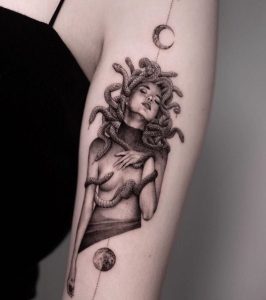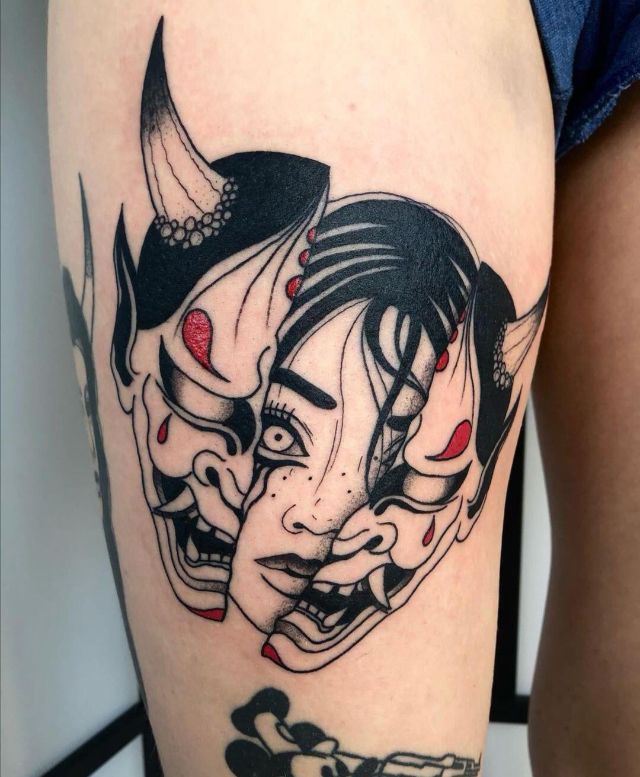Medusa Tattoo Meaning: Mythology, Symbolism, and Modern Interpretations

Tattoos have always been a canvas for self-expression, storytelling, and identity. Among the most intriguing and powerful designs is the Medusa tattoo. Known for her snake-covered hair and petrifying gaze, Medusa comes from ancient Greek mythology yet continues to inspire tattoo enthusiasts across the world today. Her story is layered with beauty, tragedy, vengeance, and power, making her one of the most complex mythological figures to ink on the skin.
But what does a Medusa tattoo really mean? Is it a symbol of empowerment, survival, or simply an artistic choice? In this comprehensive guide, we’ll explore the origins of Medusa, her place in culture, and the wide range of meanings and designs associated with this fascinating tattoo.
Who Was Medusa? The Origins of the Myth
In Greek mythology, Medusa was one of the three Gorgon sisters, daughters of the primordial sea deities Phorcys and Ceto. Unlike her immortal sisters, Medusa was mortal and, according to many accounts, incredibly beautiful. Her flowing hair and captivating appearance drew the admiration of gods and mortals alike.
However, her life took a tragic turn. Different versions of the myth tell different stories:
- In Ovid’s Metamorphoses, Poseidon violated Medusa in Athena’s temple. In anger, Athena punished Medusa, transforming her radiant hair into venomous snakes and cursing her gaze to turn men into stone.
- Other myths portray Medusa simply as a monster from birth, a creature of chaos and destruction feared by all.
Ultimately, Medusa met her end at the hands of the hero Perseus, who beheaded her with the help of divine tools, including Athena’s reflective shield. Even in death, her head retained its petrifying power, and it later became a protective symbol on Athena’s shield and armor.
This blend of tragedy, transformation, and resilience makes Medusa a figure of deep symbolic value—perfect for tattoo art.
Core Symbolism Behind Medusa Tattoos
1. Feminine Power and Protection
Medusa represents more than just fear. Many see her as a guardian, someone who protects the vulnerable from harm. For women especially, a Medusa tattoo can symbolize reclaiming power after trauma or injustice. She is not just a victim of punishment but a figure who wields her curse as strength.
2. Survival and Transformation
From beauty to monster, Medusa’s transformation speaks to life’s hardships and resilience. A tattoo of Medusa often reflects an individual’s personal evolution—surviving hardship, embracing scars, and emerging stronger.
3. Mystery and Duality
Medusa is both alluring and terrifying. She embodies the balance between beauty and danger, attraction and fear. For some, this duality mirrors their own personality or life experiences.
4. Justice and Defiance
Because her punishment was unjust, Medusa’s myth resonates with people who fight against inequality, oppression, or betrayal. A Medusa tattoo becomes a badge of defiance and a reminder never to bow to unfairness.
Popular Medusa Tattoo Designs and Styles
The meaning of a Medusa tattoo often depends on its artistic style. Here are some popular approaches:
- Realism: Highly detailed tattoos that capture Medusa’s haunting eyes and serpentine hair.
- Minimalist Line Art: Simplified outlines that maintain symbolic depth while being subtle.
- Neo-Traditional: Bold lines, exaggerated colors, and dramatic features for a striking effect.
- Black and Grey Shading: Dark tones that emphasize her fearsome aura.
- Feminine and Elegant Designs: Softer interpretations of Medusa that highlight her beauty and grace.
Ideal Placements for Medusa Tattoos
Tattoo placement can further enhance meaning:
- Forearm: A visible reminder of strength and resilience.
- Back: Symbolic of protection, as though Medusa guards the wearer.
- Chest: Close to the heart, reflecting inner power and survival.
- Leg or Thigh: Ideal for larger, more detailed designs.
- Neck: A bold choice representing defiance and individuality.
Medusa in History and Ancient Culture
Medusa’s head, also called the Gorgoneion, appeared frequently in ancient Greek art and architecture. It was used as an apotropaic symbol—a protective emblem meant to ward off evil luck. Temples, armor, coins, and shields often displayed her image, reflecting her role as both feared and revered.
This protective association carries over into tattoo culture today. A Medusa tattoo can serve as a personal talisman against negativity, echoing her role in ancient civilizations.
Modern Cultural Interpretations
In modern times, Medusa has taken on fresh meanings:
- Feminist Symbol: Many view Medusa as a figure of empowerment, reclaiming her story from victimhood to strength. Her gaze, once feared, becomes a metaphor for commanding respect.
- Artistic Icon: Designers, painters, and tattoo artists reinterpret her image as a blend of myth and modern artistry.
- Pop Culture Influence: Fashion brands like Versace have adopted the Medusa head as their logo, signifying allure, danger, and beauty.
Additional Symbolic Meanings of Medusa Tattoos
To enrich our understanding, let’s expand into deeper symbolic interpretations:
1. Rebirth and New Beginnings
Medusa’s curse transformed her life completely. For those who have gone through dramatic changes—be it healing from loss, escaping toxic relationships, or starting fresh—a Medusa tattoo marks renewal.
2. Strength in Vulnerability
Though cursed, Medusa survived as long as she could. Her endurance inspires people to embrace their scars, flaws, and past struggles with pride.
3. The Power of Fear
Her ability to turn others into stone reflects how fear itself can protect or paralyze. A Medusa tattoo may represent control over fear, turning it into a source of strength rather than weakness.
4. Beauty and Danger Combined
Medusa represents the paradox of being both attractive and intimidating. This duality resonates with those who see themselves as more than meets the eye.
Types of Medusa Tattoos With Meanings
Here’s a breakdown of popular variations and their symbolic depth:
- Crying Medusa Tattoo: This design represents pain, betrayal, and inner struggles.
- Warrior Medusa Tattoo: Shows resilience, bravery, and fighting spirit.
- Abstract or Surreal Medusa Tattoo: Highlights creativity, imagination, and individuality.
- Medusa Skull Tattoo: A combination of death and transformation, symbolizing cycles of life.
- Half-Human, Half-Snake Medusa Tattoo: Explores duality and hidden strength.
Medusa and Feminism: A Modern Reclaiming
In recent years, Medusa has been adopted as a feminist icon. Instead of seeing her as a villain, many reinterpret her as a woman who has been punished for being a victim. Her story is now linked to broader conversations about injustice, women’s rights, and the reclaiming of narratives once written by men.
For many women, a Medusa tattoo is a declaration of self-empowerment, independence, and the refusal to be silenced. It transforms her image from one of fear to one of liberation.
Celebrities With Medusa Tattoos
The popularity of Medusa tattoos isn’t limited to mythology enthusiasts or everyday tattoo lovers. Several celebrities have also embraced this powerful design, showcasing it as a statement of individuality and strength. Seeing public figures wear Medusa on their skin has helped normalize and popularize the design in pop culture.
- Lady Gaga – Known for her bold fashion and artistic statements, Lady Gaga has been linked with Medusa imagery in her music and photoshoots. She has drawn inspiration from Medusa’s symbolism of beauty, power, and misunderstood femininity.
- Angelina Jolie – While Jolie is famous for her large collection of tattoos, she has also been associated with Medusa-inspired designs, reflecting her roles in films where she embodies strong and complex women.
- Rihanna – The global superstar has showcased Medusa imagery, even appearing on magazine covers styled as Medusa. Though not confirmed as a permanent tattoo, her adoption of the look has inspired fans to choose the design for themselves.
- Ruby Rose – The actress and model, known for her striking tattoos, has been reported to include Medusa-inspired artwork in her collection, symbolizing defiance and strength.
- Post Malone – With a reputation for detailed and meaningful tattoos, Post Malone has also been linked with Medusa art, showing his appreciation for mythological and symbolic imagery.
These celebrities demonstrate how the Medusa tattoo crosses boundaries of gender, industry, and personal style, making it one of the most versatile mythological designs in modern tattoo culture.
Things to Consider Before Getting a Medusa Tattoo
Before committing to this design, here are a few things to think about:
- Research the Myth: Understand Medusa’s story and decide which version resonates most with you.
- Choose an Experienced Artist: Snake details, facial expressions, and shading require skill to capture Medusa’s power.
- Decide on Placement and Size: Larger designs allow more detail, while smaller ones may emphasize symbolism.
- Reflect on Meaning: Consider what Medusa symbolizes in your life—protection, power, resilience, or transformation.
Medusa Tattoo Design Ideas





Final Thoughts
A Medusa tattoo is not just a piece of art; it’s a story inked on the skin. From her origins in Greek mythology to her modern reimagining as a feminist and cultural icon, Medusa continues to inspire. Her tattoo embodies power, transformation, protection, and individuality.
Whether you choose a bold, detailed design or a minimalist outline, Medusa’s story becomes part of your own journey—reminding you that beauty, strength, and resilience often emerge from hardship.





